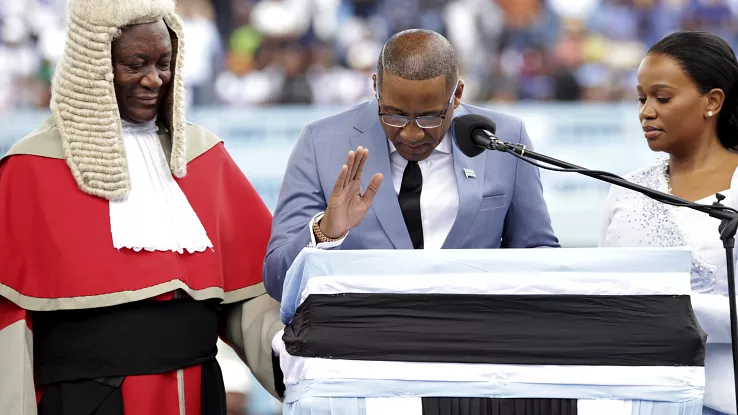Duma Boko sworn in as Botswana’s new President
Thousands of citizens from across Botswana gathered in the capital, Gaborone, on Friday for the inauguration of Duma Boko as the country’s new president. His election marked the end of the Botswana Democratic Party’s 58-year rule, signaling a historic shift in power.
Boko, leader of the Umbrella for Democratic Change (UDC)—a coalition of the Botswana National Front and Alliance for Progressives—secured 36 parliamentary seats in a hard-fought election that ousted former president Mokgweetsi Masisi and denied him a second term.
Boko was sworn in after arriving at the ceremony in an open-top vehicle, accompanied by soldiers on white horses carrying the national flag. The inauguration was attended by thousands of citizens and various dignitaries, including former president Ian Khama, South African Deputy President Paul Mashatile, and Julius Malema, leader of South Africa’s Economic Freedom Fighters.
In his inaugural speech, Boko called for unity, urging the nation to move beyond division and personal grievances. He also extended praise to his predecessor, Masisi, for his peaceful concession of power. “This is a historic moment, one of the rarest that can only be appreciated in hindsight,” Boko said, emphasizing the need for reconciliation and nation-building.
He expressed deep gratitude to the people of Botswana for electing him, and in a heartfelt moment, he told the crowd, “It gives me great pleasure when I look at you, and you look back at me and say, ‘That’s my boy.’ You say so because you raised me. You love me. And you know I love you in return.”
Boko’s speech, though full of optimism, offered little in terms of concrete policy details. During the campaign, his party pledged to tackle corruption, introduce a minimum wage of 4,000 Pula ($302) per month, establish an unemployment allowance, increase benefits for the elderly, and promote the creation of new businesses.
Unemployment remains a pressing issue, with recent surveys showing it as the top concern among citizens. Official data reveals that the unemployment rate has risen to 27.6% in 2024, up from 25.9% in 2023.
Botswana’s economy, heavily reliant on diamond exports, has been impacted by the global decline in demand for mined diamonds, affecting the revenue of Debswana, the joint mining venture between the government and De Beers.
There are growing calls for greater national ownership and more benefits from the diamond industry, as citizens seek broader economic opportunities.
For many Batswana, Boko’s peaceful victory represents a momentous shift. The smooth transition of power to the opposition was seen by some as an unprecedented achievement for the country’s democracy.






















































